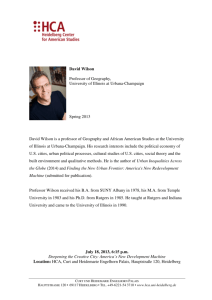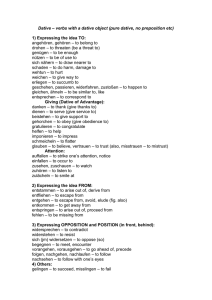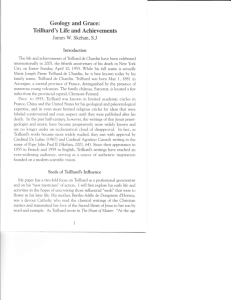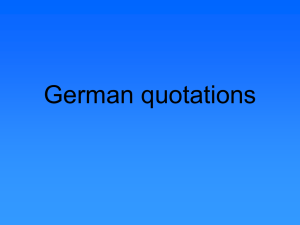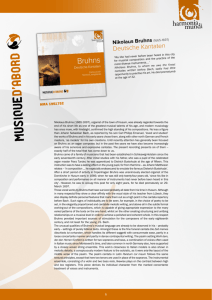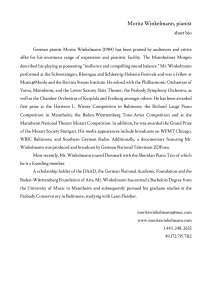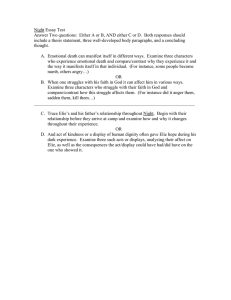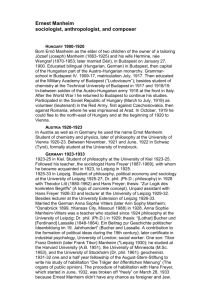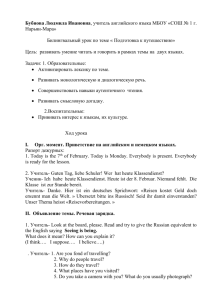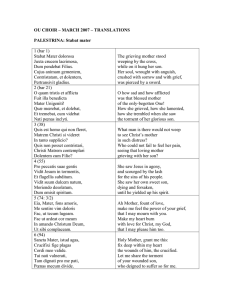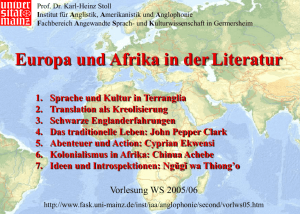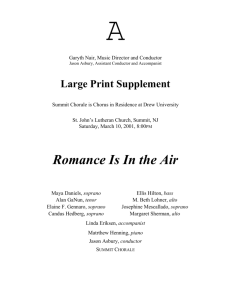Read Joseph`s Essay
advertisement
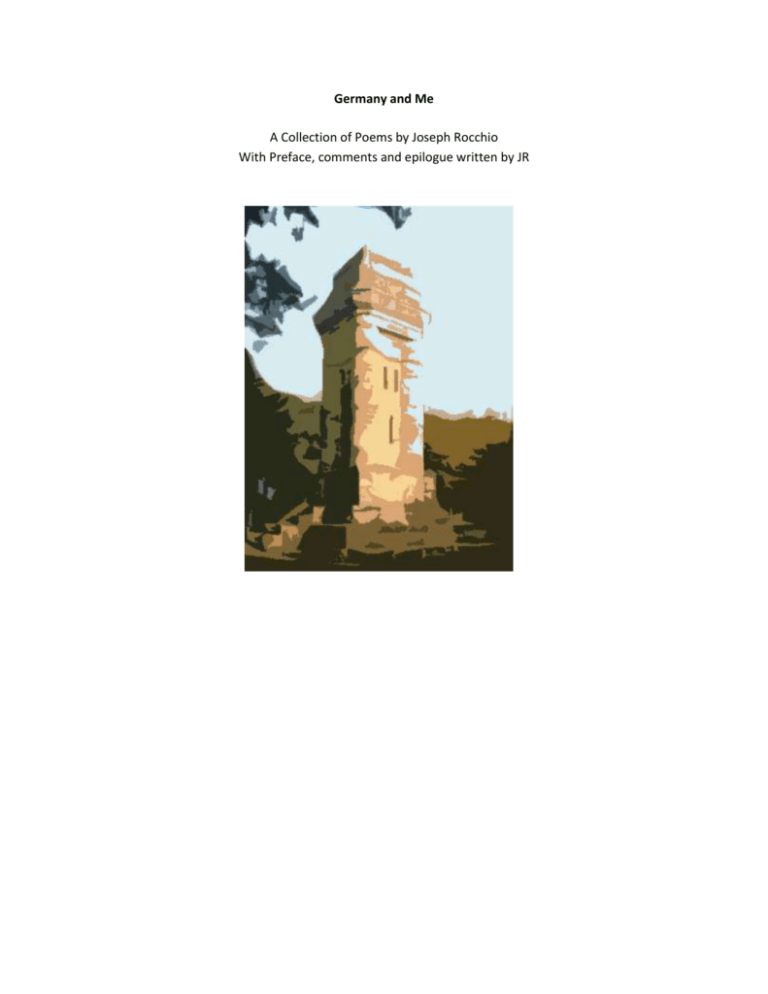
Germany and Me A Collection of Poems by Joseph Rocchio With Preface, comments and epilogue written by JR Preface to the First Edition: When compiling a list of the greatest German language poets of the 21st century it is very rare to find one without “Dunkel” at least in the top five. Ingrained into the public consciousness ever since his existential love ballad “Mein Leben ist ein Paradox”, Dunkel was spewing out various forms of media all throughout his very eventful career. And while his film “Mr. Anonymous” (winner of a world record 12 Academy Awards) and his Nobel Prize winning “Bismarckturm” book series are without a doubt his more well-known works, his poetry (particularly his German language material) is actually quite well received by critics even to this day. In order to truly see inside the mind of Rocchio, in order to truly peer into the depths of his words and understand what he meant, we must look to where he was/what he was doing at the time that he wrote these pieces. As in fact, many of his more popular German poems were actually written while in Germany itself…which, in my humble opinion, can help us form conclusions regarding his connection to Germany and his experiences that he had while there. Unfortunately I was only able to pick a limited number of pieces but if you are interested check out some of Rocchio’s German poetry collections, such as “Der Einzige Weg”, “Keine Hoffnung” or “Meine Marmalade”. I hope you enjoy this collection and my (hopefully) insightful thoughts/intros sprinkled throughout, JR I. Before Germany: Rocchio’s most renowned work from the time before he went to Germany is without a doubt “Das Lebenspreis”, which was written in the Summer of 2014 during the “German Summer School” at the University of Rhode Island. Clearly one can see throughout the poem that he still had much work to do regarding his German language skills and clearly opted for simpler sentences/vocabulary when possible. “Das Lebenspreis” was written at what some see as one of the “Peaks of Dunkelheit” that Rocchio reached in his career, and one can just see through the dark tragic mood of the poem that he was a very disturbed individual. Das Lebenspreis (Summer 2014) Wirklich Du sagst mir Wirklich Du sagst Aber ich kann nicht glauben Ich habe viel Angst Wir leben Wir sterben Alles ein Kreis Und jeder bezahlt Den groß Lebenspreis Aber du denkst dass Du eine Lösung hast Ich glaube das nicht Du bist ein Phantast Wir lieben, Wie leiden Alles ein Kreis Und jeder bezahlt Den groß Lebenspreis Aber du willst Dass du für immer lebst Unmöglich? Wahrscheinlich. Deine Misstände nie behebst. Wir lachen, Wir weinen Alles ein Kreis Und jeder bezahlt Den groß Lebenspreis Vielleicht musst du fragen Welches ist schlimmer? Dein Herz anzuhalten Oder zu leben für immer Wir fragen Wir träumen Alles ein Kreis Und jeder bezahlt Den groß Lebenspreis II. Arrival Evidence suggests that “Der Telegraf” was written during one of Rocchio’s very first days in Germany…it is speculated that the idea for it was conceived while chilling with some of the other “Wolfbutts” near the entrance to the Braunschweig Schloss. “Der Telegraf” seems to be another attempt of Rocchio’s at dealing with his existential angst and trying to somehow find meaning throughout the madness in this world. One interpretation of the title of the poem is that the poem itself was a message…a message to whoever is out there willing to listen, willing to try and comprehend. But these messages mean whatever the “listener” wants them to mean…it doesn’t matter what the writer/”speaker” intended. This conflict between intention and interpretation is one visited quite often throughout Rocchio’s works and was truly a recurring theme throughout his lifetime. Der Telegraf (Fall 2014) Es ist alles vorbei, Die Sonne scheint nicht, Ich spreche zu niemand mit diesem Gedicht Meine Wörter meint irgend, was sie wollen Aber sie sind nicht, Weil sie nicht sein sollen Also tschüss meine Glatze Wir haben nie gesprochen Ich errinere mich an alles, Was wurde zerbrochen.“ III. Settling In Two poems, with somewhat more grammatical complexity than the earlier ones, were written in late Fall 2014 again dealing with themes of existential angst, finding meaning an d regret for the past. As one can see, with “Etwas Anderes” Rocchio seemed to be already comfortable enough with written German to get creative with style/layout and with “Die Frage” he seemed to try and go an almost rhythmic route. Of course, as many of you probably know, “Die Frage” was made into a top selling song by the brilliant guitarist and musician Pat Molak. While the song is great, “Die Frage” is also very thought provoking when read alone without the background music. Etwas Anderes (Fall 2014) Ich frage oft Fragen, Die nicht Beantwortet Werden Können. Ich denke darüber. Vielleicht Ich kann das Fenster Öffnen. Aber Ich weiß es nicht. Nicht wie es gehen wird. Nicht wie es sein soll. Nicht wie es sein könnte, Wenn ich etwas anderes gemacht hätte. Die Frage (Fall 2014) Erinnerst du dich an die Zeit, In die du mir gesagt hast? „Manchmal fühle ich in dieser Welt, wie ein ungeladener Gast. Die Nächte sind zu schwarz für mich Und die Tage sind zu hell. Hab ich diese Sorgen ganz allein? Oder sind sie universell?“ Und dann gingst du weiter, Und hast mir gefragt: „Was ist wirklich ein Mensch? Ich hatte kein Antwort, das erinner‘ ich Aber ich fragt darüber was du denkst „Ein Pest ist was wir sind,“ du sagtest „Das Leben ein dunkles Licht Hoffnung gibt es aber es ist so wenig. Was ist deine Ansicht?“ Schweigen kam dann und du sprachst nicht mehr Aber ich wollte etwas sagen. „Ich weiß genau nicht was das Leben ist Aber es kann man echt erschlagen. Hoffnung- es gibt Träume- sie sind Das Leben- ein dunkles Licht. Mach was du kannst, und sei wer du bist, Das ist meine Ansicht! IV. Travels Written quite close to the end of his stay in Germany, “Quer mit mir” is a reference to the much renowned “Quer durchs Land” ticket offered at Dunkel’s time in Germany by Deutsche Bahn. This ticket was purchased many times by Rocchio and his friends when searching for the various towers. Supposedly “Quer mit mir” was a poem written by Joseph to the voice actor/comedian Bryce Holden, pleading Bryce to come with him on another one of his adventures. It is unknown whether Bryce joined in or not. Quer mit mir (Spring 2015) Machen Sie den quer mit mir Machen Sie den quer Ansonsten sind wir ganz allein Angesichts der Leer’ Hoffnung gibt es nicht fur uns Es sei denn, find‘ wir Bier Machen Sie den quer mit mir Machen Sie den quer Epilogue: When peered into and analyzed, Rocchio’s poems while in Germany do paint a pretty vivid picture of the times he had there as well as give insight to various motivations and philosophies he had at that point in his life. Many of his poems seem to be dark, tragic or existential in nature, but I believe this to be somewhat of a misinterpretation of Rocchio’s works. As some think this means that Rocchio was a quite unpleasant man. While the jury is still out on that one, accounts from people that personally knew him differ widely from him being a blabbering fool to a vain buffoon to a thoughtful intellectual, and to tell the truth it seems very difficult to judge the man in that respect. While many of his poems do seem to show this idea of existential angst and tragedy, all of these poems must be taken into context of Rocchio’s most significant discovery in Germany: that of the Bismarck towers. With the lack of existential poetry from Rocchio after Fall 2014, it could be argued that the Towers were what treated this angst. It was Dunkel himself who, in the Bismarck tower series, compared his quest to visit all the towers to the very same journey that all of us must take when looking for meaning in life. I believe that Rocchio’s year in Germany made him the poet and thinker he always wanted to be. It gave him the firsthand experience of another culture, taught him the innerworkings of another language, and pointed him onto the path that he so famously called in his “Bismarckturm” series “der einzige Weg”. Ohne Deutschland gäbe es kein Dunkel Joe. JR
